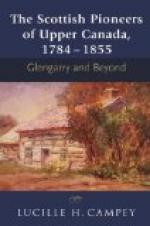From Lake Clowey the northern progress was made on foot, steady and fatiguing walking over the barren grounds. The wooded region had been left behind to the south; but for a distance of about twenty miles outside the living woods there was a belt of dry stumps more or less ancient. According to Hearne, these vestiges of trees to the north of the present forest limit were an indication that the climate had grown colder during the seventeenth and eighteenth centuries, because, according to the traditions of the Indians and the remembrances of their old people, the forest had formerly extended much farther to the north.
Whilst they were staying for the canoe building at Lake Clowey, Hearne was a great deal bothered by the domestic troubles of his Indian friend Matonabi. This man had been constantly trying to add to his stock of wives as he passed up country, and at Clowey he had met the former husband of one of these women whom he had carried off by force. The man ventured to reproach him, whereupon Matonabi went into his tent, opened one of his wives’ bundles, and with the greatest composure took out a new, long, box-handled knife; then proceeded to the tent of the man who had complained, and without any parley whatever took him by the collar and attempted to stab him to death. The man had already received three bad knife wounds in the back before other people, rushing in to his assistance, prevented Matonabi from finishing him. After this, Matonabi returned to his tent as though nothing had happened, called for water, washed the blood off his hands and knife, and smoked his pipe as usual, asking Hearne if he did not think he had done quite right!




